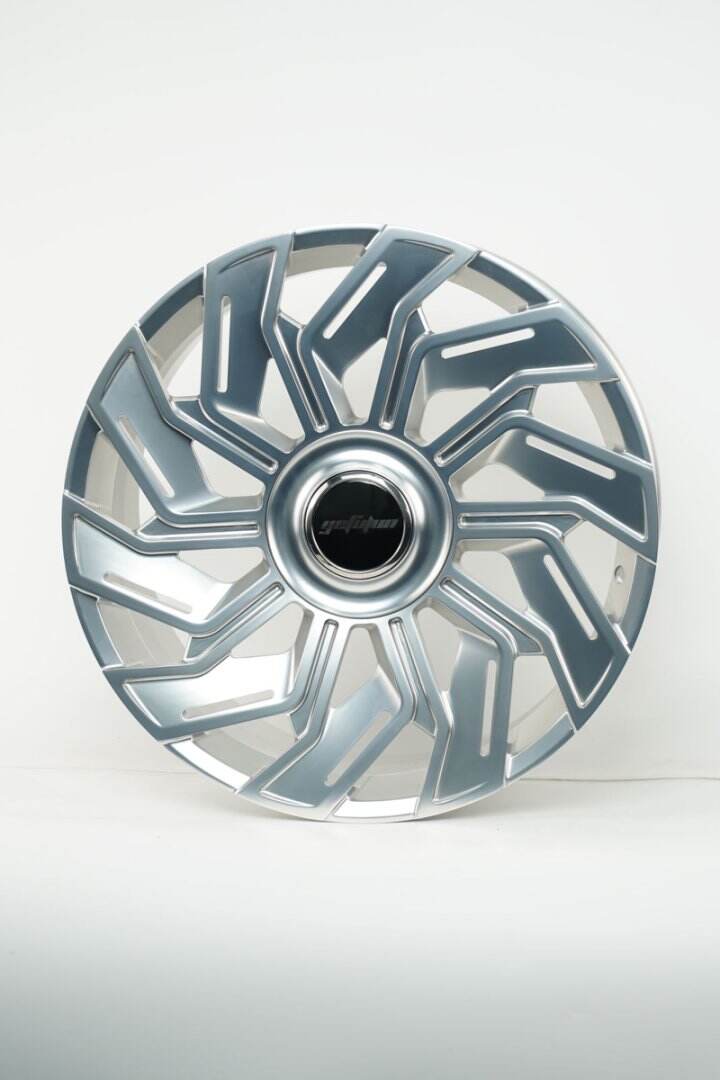What Are Monoblock Wheels?
Definition and Construction
Monoblock wheels come from one solid chunk of aluminum, giving them extra strength and lasting power. The way they're built cuts down on weight without sacrificing performance. Car makers rely on fancy forging methods and special casting processes when building these wheels, something that really helps shave off pounds. What makes this approach so good is how it improves fuel efficiency while at the same time making cars handle better around corners. Many people love monoblock wheels because they look sharp and work great too. That's why serious car fans often go for them when they want something that looks good and performs even better.
Historical Development in Automotive Design
Wheel design in cars has changed quite a bit over time, moving away from old school multi piece setups to today's monoblock designs. For race cars and high performance models, this change really matters because drivers need both safety and speed when pushing limits on track days or street circuits. Back around the 80s and 90s, manufacturers started adopting these one piece wheels as part of bigger efforts to make cars faster while using less gas. The solid construction of monoblock wheels isn't just about looks either they actually perform better under stress, which explains why brands like Porsche and Ferrari have embraced them for decades now. These wheels handle heat better during aggressive driving and distribute weight more evenly across the contact patch, giving drivers that extra edge when cornering at high speeds.
Key Materials: Aerospace-Grade Aluminum Alloys
Most monoblock wheels come from aerospace grade aluminum alloys because they offer an amazing balance between strength and weight. When manufacturers pick these particular metals, it really affects how well the wheels perform over time. These special alloys don't rust easily either, so they can handle all sorts of stress without breaking down, which makes them great for racing cars and other high performance vehicles. Car makers know this stuff gives them an advantage against competitors, especially when building wheels for serious drivers who want something that lasts through countless track days. Looking at the bigger picture, companies keep investing in better materials like these because customers expect nothing less than top quality performance from their investment.
Key Advantages of Monoblock Wheels
Lightweight Design for Enhanced Performance
Monoblock wheels tend to weigh around 30% less compared to standard multi-piece designs because they're made from a single piece of forged aluminum. The reduced weight makes a real difference when it comes to how fast a car accelerates and stops, giving drivers better control overall. Lighter wheels mean less rotational mass spinning around the axle, so engines don't have to work as hard. This translates to better gas mileage too, while putting less strain on shocks and struts over time. For anyone looking to get more out of their ride without breaking the bank on modifications, switching to monoblock wheels is probably worth considering for both performance gains and saving money on repairs down the road.
Superior Strength and Durability
Monoblock wheels are really strong because they're made from just one piece of metal instead of being bolted together. They don't bend or crack easily when put under stress, which regular wheels tend to do after a while. For racers who need wheels that can handle extreme conditions without failing, this kind of toughness matters a lot during those tight turns and hard landings off jumps. People who drive these kinds of wheels usually find themselves spending less money on repairs down the road since there's nothing to break apart. That's why so many serious drivers go for monoblock wheels when they want something that lasts forever but still performs great on track.
Improved Handling and Fuel Efficiency
Lighter unsprung weight from monoblock wheels means cars handle better overall. Drivers notice this when taking corners since there's more grip and control feels sharper. Stability improves too, so the ride isn't as bumpy or unpredictable. Beyond just being lighter, these wheels also cut down on air resistance and rolling drag which helps save gas. Some research suggests around 5% fuel savings in certain conditions, though results can vary based on driving habits and vehicle type. For anyone wanting their car to perform well while keeping costs down at the pump, monoblock wheels offer a solid compromise between sporty handling and practical efficiency.
Aesthetic Versatility for Modern Vehicles
Monoblock wheels have this clean look that just works with almost any car design, which explains why so many luxury and performance brands go for them. There are tons of different finishes out there too from brushed aluminum to carbon fiber looks, letting people customize their ride while still keeping all the performance benefits intact. That's probably why these wheels dominate the aftermarket scene so much right now, especially for folks who want something stylish but still technically sound. Car fans today really love getting that perfect balance between how things look and how well they work, and monoblock wheels hit that sweet spot pretty well.
Monoblock vs. Multi-Piece Wheels
Structural Integrity Comparison
Looking at different wheel designs, monoblock wheels tend to have better structural strength because they're made as one solid unit rather than multiple parts. Multi piece wheels are basically several components fastened together with bolts, while monoblock versions come from a single block of metal during forging. This means there are fewer places where things might go wrong over time. Mechanics often point out problems with multi piece setups where bolts can work loose or cracks start forming when subjected to heavy loads. For cars that need to handle extreme conditions or racing environments, this makes all the difference. Research shows why many performance oriented drivers stick with monoblock construction despite higher costs upfront. They just last longer and don't give trouble in ways that multi piece alternatives sometimes do.
Weight Distribution and Rotational Mass
Monoblock wheels handle weight distribution really well, something that makes a big difference when cars are pushed hard through corners or on twisty roads. The way they spread weight evenly across the wheel helps keep things stable and gives better acceleration since there's less rotational mass to deal with. Drivers notice this right away in how the car responds to inputs and tracks through turns without feeling floaty or disconnected. That's why most performance cars come with monoblock wheels from the factory these days. Car manufacturers know their customers want that extra edge in handling, so they specify them as standard equipment on models built for serious driving enthusiasts.
Aftermarket Applications: Tesla Rims and Offset Configurations
Aftermarket wheel demand has been climbing steadily, particularly among Tesla owners looking to personalize their rides. Custom monoblock wheels now dominate this market segment, crafted specifically for each vehicle's unique requirements. The offset configurations play a big role here, making sure tires sit just right without rubbing against anything when cornering at speed. For electric cars that can hit serious velocities, getting these settings correct means better handling and safety overall. Manufacturers report seeing more requests for specialized monoblock designs suited to EVs, showing how wheel customization continues to evolve alongside automotive technology advances.
Choosing the Right Monoblock Wheels
Understanding Wheel Rim Sizes and Fitment
Getting the right wheel rim size matters a lot for how well a car performs and stays safe on roads, affecting things like traction and overall stability. When rims are sized correctly, cars tend to handle better and stay grounded through different weather conditions and road surfaces. Most folks should check those fitment charts before buying new rims just to make sure everything works together properly with what the manufacturer designed. Wrong size rims can cause all sorts of headaches down the road including tires rubbing against parts they shouldn't and alignment problems that make driving uncomfortable at best. Taking time to pick the right rims upfront saves money in repairs later while keeping the ride smooth and predictable mile after mile.
Offset Considerations for Optimal Vehicle Dynamics
Getting to grips with wheel offset matters a lot when it comes to getting the most out of a vehicle's handling characteristics. The offset determines where the wheel sits relative to the suspension setup, which directly impacts how responsive the steering feels and how stable the car remains during corners. Picking the correct offset value really makes a difference here, leading to better control over the road and increased safety margins. What many drivers don't realize is that proper offset selection also helps cut down on wear and tear for suspension bits like shocks and struts, so the car keeps performing well for longer periods. Taking time to think through wheel offset choices means keeping the car agile without sacrificing component lifespan, ultimately creating a driving experience that works just as well for daily commutes as it does for weekend track days.
Maintenance Tips for Long-Term Performance
Keeping monoblock wheels in good shape requires regular maintenance, particularly important for those driven in tough conditions like salted roads or off-road terrain. Cleaning and checking wheels on a routine basis stops dirt and grime from building up, something that not only looks bad but actually affects how air flows around the vehicle, potentially causing problems down the road. When putting wheels back on after cleaning, getting the bolts tightened just right according to specs matters a lot. If they're too loose, the whole wheel could come off while driving; too tight and we risk damaging components. Checking wheels seasonally helps catch small problems before they become big ones. A quick look at the contact points between tire and rim might reveal cracks or corrosion that weren't visible during normal inspections. The extra time spent on these checks pays off in longer lasting wheels and safer driving experiences overall.




